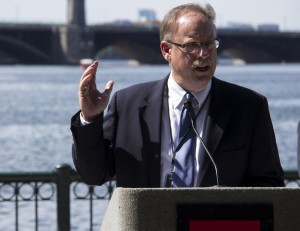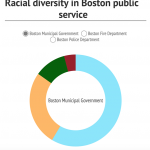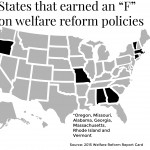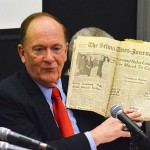
The Environmental Protection Agency awarded the Charles River a water quality rating of “A-” on Wednesday, the highest grade the river has received since the EPA launched their Clean Charles River Initiative in 1995. In a crowd of about 30 people, representatives from the EPA, Boston Museum of Science, Charles River Watershed Association, Massachusetts Department of Environmental Protection and Massachusetts Water Resource Authority spoke at the Museum of Science about how the water quality of the Charles River has improved and how the city should continue to give the river the attention it deserves. “We all know what the Charles was,” said EPA’s Regional Administrator Curtis Spalding. “We know it was actually very polluted. It was considered a public nuisance. Now today, runners, boaters, duck boaters and so-on are around on the Charles. It’s been a cornerstone of the transformation of Boston, from what was viewed as a dirty, rough city to now a city people describe as Athens of America.” In 2003, the Charles received a “B-” water quality rating, an improvement compared to the “D” grade it received in 1995. The grade awarded Wednesday is the highest in decades, and it shows how usable the Charles has become, said Mass. DEP Deputy Commissioner Gary Moran. “It is now safe for boating 96 percent of the time and for swimming 70 percent of the time,” he said. “That’s a difference of when boating was at 39 percent when this initiative started in 1995, swimming at just 19 percent.” Boston Mayor Martin Walsh has lauded community efforts to improve the Charles’ water quality and said no single organization could have made the river as clean as it currently is. “The cleanup of the Charles River has been a tremendous success story that speaks to the power of good policy and collaboration,” Walsh said in a Wednesday press release. “I’d like to applaud and thank all those involved in this effort…and in particular, the local volunteers who have made this possible. You continue to raise the bar for urban rivers across the U.S. and world.” Several individuals at Wednesday’s press conference worked personally to clean up the Charles and applauded the work of their fellow clean-water advocates. CRWA intern Anjana Tamrakar said she was happy to see tangible evidence of what her organization has accomplished. “It’s my pleasure to work with an association that has done so much,” she said. “The Charles River was not in a good condition at all. They had tried for more than two or three decades, and the quality has improved so much. Now, you can see people on the river swimming, rowing and boating. I want to work in this industry to make the city and world better for everyone.” Elisabeth Cianciola, an aquatic scientist for the CRWA, said she hopes other environmental projects can be as successful as the CCRI. “It’s inspiring to be working with people who have been committed to this project for so many years. They’ve really made measureable progress,” she said. “I doubt that I would have been as interested in working with the CRWA if I hadn’t seen that it already had a great track record with all these different restoration projects.” Elie Saroufim, a special projects coordinator for the Boston Water and Sewer Commission, said he remembers how contaminated and dangerous the Charles River used to be. “I remember when I was a kid, it was one of those things where we would dare each other back in high school to jump into the Charles, and we would joke about growing a third leg,” he said. “And today, if someone asked me to jump into the Charles, I would actually comfortably know that I could and be healthy and safe, and that’s a wonderful thing.”




